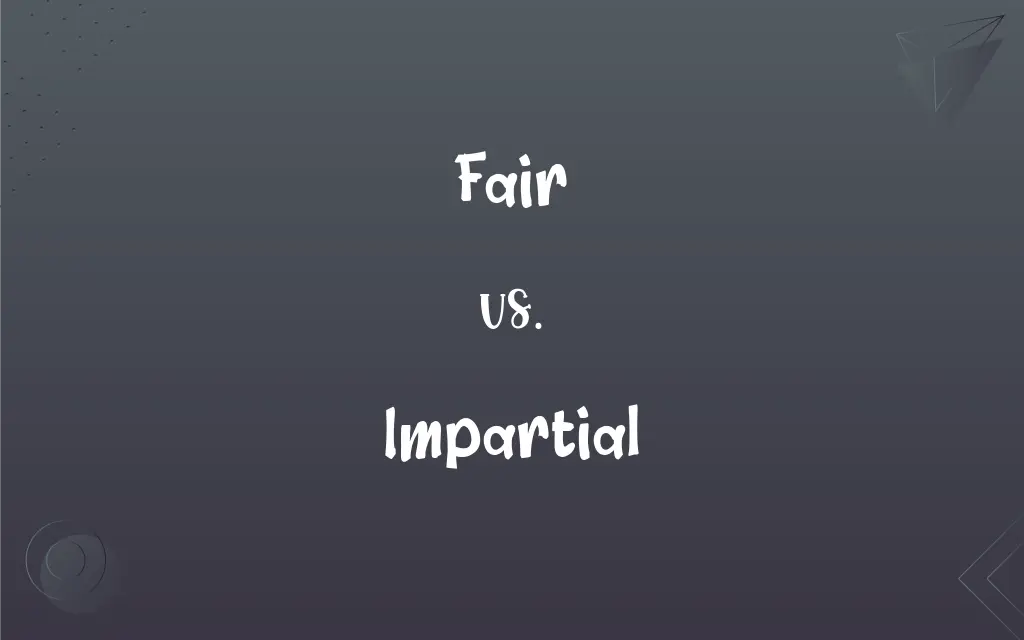Fair vs. Impartial: What's the Difference?
Edited by Aimie Carlson || By Harlon Moss || Published on November 28, 2023
Fair implies just and appropriate treatment, while impartial means having no bias or favoritism.

Key Differences
Fairness is a principle that combines justice, equality, and honesty, suggesting a balance of treatment that is right and appropriate. It can apply to a wide range of scenarios, from playing a game to conducting business. Impartiality, on the other hand, is a specific characteristic of neutrality, especially in decision-making processes, highlighting the absence of bias or prejudice.
In the context of a legal trial, a fair process is one in which the laws are applied consistently to all parties involved, ensuring a just outcome. An impartial judge is someone who has no personal stake in the outcome and makes decisions solely based on the facts and law, without favor toward any side.
Fairness often involves a sense of ethical conduct and equity, where all individuals are given equal opportunities and treatment. Impartiality is more about an objective stance, where personal feelings or interests do not affect judgment, crucial for roles such as referees, judges, or arbitrators.
When discussing issues of social policy, fairness might refer to the equitable distribution of resources and opportunities among all members of society. Impartiality in this realm would focus on the unbiased and even-handed administration of policies without regard to one's social position or identity.
In summary, while fairness and impartiality can intersect, fairness is a broader concept encompassing just and equitable treatment, whereas impartiality is the absence of bias, often required in positions of authority or judgment.
ADVERTISEMENT
Comparison Chart
Definition
Equitable and just treatment or conditions.
Lack of bias or prejudice; neutrality.
Associated with
Justice, equality, and honesty.
Objectivity and detachment.
Application
General conduct and ethics.
Decision-making and judgment.
Key Characteristics
Equitableness, non-discrimination, honesty, and moral rightness.
Neutrality, unbiased stance, and absence of personal interest.
Expectation
In societal norms and morality.
In roles requiring judgment, like judges or umpires.
ADVERTISEMENT
Fair and Impartial Definitions
Fair
Free from bias.
It was a fair competition since no participant had an advantage.
Impartial
Not favoring one side over another.
The impartial mediator facilitated the negotiation effectively.
Fair
Moderately good; satisfactory.
The weather was fair enough for a day at the beach.
Impartial
Not connected to or influenced by one particular person or group.
As an outsider, she could offer an impartial opinion on the dispute.
Fair
Light in color, particularly regarding hair or complexion.
She had fair hair and green eyes.
Impartial
Treating all rivals or disputants equally.
The umpire is known for being impartial during games.
Fair
A gathering of stalls and amusements for public entertainment.
We won a teddy bear at the county fair.
Impartial
Free from undue bias or preconceived opinions.
An impartial jury is essential for a fair trial.
Fair
Equitable and just.
The teacher strived to create a fair grading system.
Impartial
Neutral, especially in matters of decision-making or judgment.
The committee made an impartial decision on the award recipient.
Fair
Light in color, especially blond
Fair hair.
Impartial
Not partial or biased; unprejudiced.
FAQs
What does impartial mean?
Impartial means neutral and not influenced by personal feelings or interests.
Can a person be fair but not impartial?
Yes, someone can treat people fairly but still have a bias or preference.
Is it possible to be impartial but not fair?
It's less common, as impartiality often leads to fairness, but certain impartial decisions can be perceived as unfair by some parties.
Is impartiality always objective?
Impartiality strives to be objective, but it's a human quality and can be subject to subconscious biases.
What does fair mean?
Fair means just, equitable, and free from bias.
Why is being fair important?
Fairness is important for maintaining trust and equality in social interactions.
Why is impartiality crucial in certain roles?
Impartiality is crucial to ensure decisions are made based on facts and not personal interests, especially in legal or competitive situations.
How do you demonstrate fairness?
By treating everyone with equal respect and applying rules consistently.
What is an impartial witness?
An impartial witness is someone who gives testimony without favoring any party in a legal case.
Can fairness be subjective?
Yes, perceptions of fairness can vary between individuals and cultures.
Does fair mean equal?
Fair often means equal, but it can also mean just treatment that might not always be identical.
Can impartiality be measured?
Impartiality can be assessed by examining the neutrality of the decision-making process.
What is a fair trial?
A fair trial is one in which legal rights are respected and due process is followed.
How does fairness apply in sports?
Fairness in sports involves following rules and maintaining an equal playing field.
Can businesses operate fairly?
Yes, businesses can operate fairly by engaging in ethical practices and providing equal opportunities.
How can organizations ensure impartiality?
By establishing clear, unbiased policies and procedures, and providing training on neutrality.
Is fairness a legal requirement?
In many cases, laws are designed to ensure fair treatment of individuals.
Do laws ensure impartiality?
Laws aim to provide frameworks for impartiality, especially in the justice system.
How can someone show impartiality?
By making decisions without personal bias and considering all viewpoints objectively.
How is impartiality maintained in journalism?
By reporting facts without inserting personal opinions or favoring sides.
About Author
Written by
Harlon MossHarlon is a seasoned quality moderator and accomplished content writer for Difference Wiki. An alumnus of the prestigious University of California, he earned his degree in Computer Science. Leveraging his academic background, Harlon brings a meticulous and informed perspective to his work, ensuring content accuracy and excellence.
Edited by
Aimie CarlsonAimie Carlson, holding a master's degree in English literature, is a fervent English language enthusiast. She lends her writing talents to Difference Wiki, a prominent website that specializes in comparisons, offering readers insightful analyses that both captivate and inform.






































































